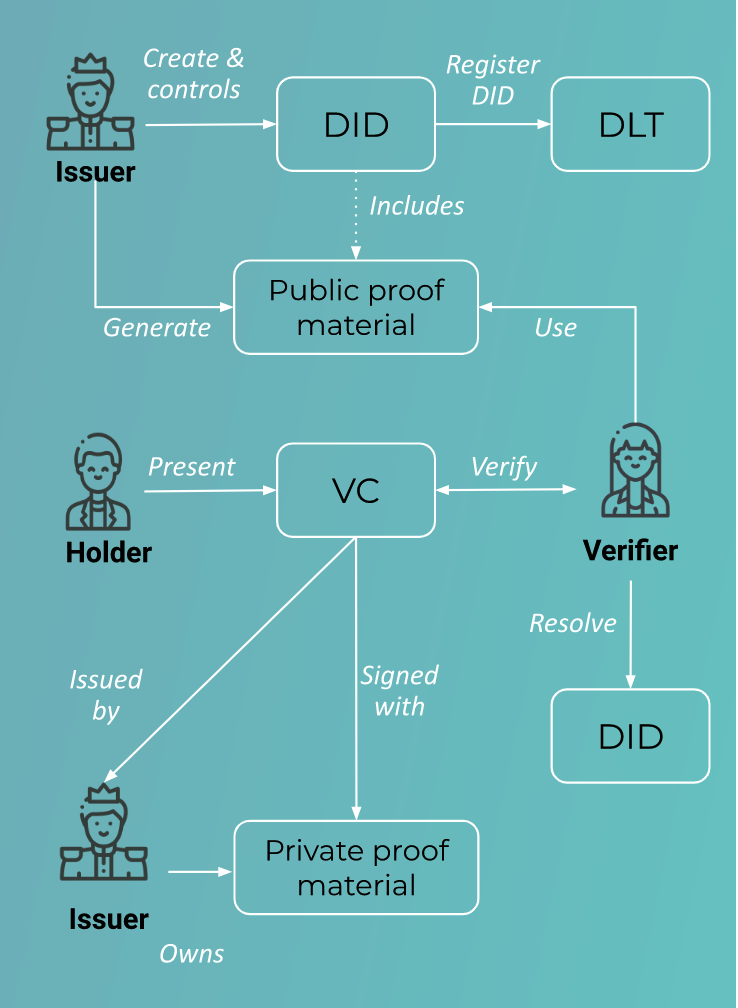Digital Identity in Trade
Introduction
In the international trade business domain Digital identity is a critical aspect to ensure authenticity, accountability, non-repudiation, and integrity of the shared information. The World Economic Forum and the W3C recommends the usage of Decentralized Identities (DIDs). A DID is a new type of identifier that is globally unique, resolvable with high availability, and cryptographically verifiable. DIDs are typically associated with cryptographic material, such as public keys, and service endpoints, for establishing secure communication channels.
When it comes to digitalised trade certificates (represented as Verifiable Credentials), DIDs allow participation and verification of digital documents without relying on a centralised and foreign authority. In fact, the possession of a DID by each actor allows playing different and decoupled roles at different times:
- Issuer, for instance, the Customs Authority of the exporting country, can emit certificates that can be verified by a foreign authority without having to contact back.
- Holder, for instance, the Exporter, can present a signed and verifiable trade certificate to a local or foreign authority, so that can be seamlessly verified.
- Verifier, for instance, the Customs Authority of the importing country, can evaluate whether a certificate is authentic or not without direct interaction with the issuer.
Decentralised Digital Identities can play a crucial role in improving and digitising current trade business processes. Besides, DIDs are already being adopted by the Government of Spain (norm UNE 71307-1:2020), the European Commission (EBSI) and could also enable interoperability with the REX system.
If you want to know more about how we envisage the future of trade digitalisation in Morocco , please continue reading.

Source: W3C
Current Process
According to the current process, the exporter needs to visit several authorities with several documents. This is to get important documents so as to attain the status of an Authorized Economic Operator (AEO). The status of an Authorized Economic Operator is provided by the Ministry in charge of Trade. A user journey showing the whole process of becoming an Authorized Economic Operator can be found here.
For the process of getting a Certificate of Origin, the user needs to be an Authorized Economic Operator. The document of Status of Authorized Economic Operator, together with the Commercial invoice (or any document that is sufficiently detailed with the goods to be exported) and a DUM is required. These documents are provided to the customs and a Certificate of Origin is issued either as a EURO1 certificate or EURO-MED certificate based on the location the export is going. The user journey can be found here.
With Digital Identity
With Digital Identity and Verifiable Credentials, all the participants in the user journey shall own a Decentralized Identity. This changes the User Journey towards the end. Instead of the Ministry of Trade issuing a physical document being an AEO, a credential is issued that is an AEO. The format is digital (JSON-LD), interoperable (W3C standard) and is shared to the exporter. This is as shown here. At the end we can see the Ministry of Trade issuing out the Authorized Economic Operator credential as a Verifiable Credential here.
When the trader is applying for an Export Certificate, instead of getting a physical copy of the COO, the trader shares his/her credential as an Authorized Economic Operator to the Customs. He/she shares that together with the Commercial Invoice and the DUM. After verifying the credential presented, the customs system then generates a digital copy of the COO as a Verifiable Credential with which the Exporter can interact with. This is as shown here.
With Other Documents
The same Authorized Economic Operator credentials that are issued by the Ministry of Trade can then be used when applying for other documents, like a Phytosanitary Certificate.
Advantages of adopting DIDs
- It is possible to verify user identities in a decentralized manner; without complex system integrations.
- Each transaction can be associated with a DID, thus ensuring accountability.
- Self-management of credentials, it enables to only share information needed for the identity verification process (selective disclosure).
- DIDs are generic and can be applied to different contexts, such as reporting events in a supply chain, apply for banking services, provide a track record towards new business partners etc.
Advantages to the Exporter
Some of the advantages of using a Decentralized Identity and Verifiable Credentials to an exporter are:
- Reduces the risk of losing physical papers
- Reduction of physical roles
- No need for re-verification of roles in each and every government agency by the exporter
- Reduces time spent on bureaucracy, as trust can established at a distance through a simple digital procedure
Advantages to the Authorities
Some of the advantages of using a Decentralized Identity Verifiable Credentials by the Authorities are:
- Easy sharing of documents such as COO with other government agencies
- Fraud is considerably reduced, as Verifiable Credentials are more tamper-evident and more trustworthy than their physical counterparts.
- There is no vendor lock-in to specific infrastructure providers (DIDs and VCs are based on an open standard)